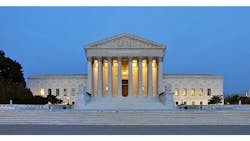Unions Prevail as US Supreme Court Deadlocks in Fees Case
The U.S. Supreme Court deadlocked on March 29 in a 4-4 decision that effectively affirms the right of public employee unions to collect mandatory fees from non-members in states that allow the practice.
The court had been expected to rule against the unions before the death in February of conservative justice Antonin Scalia, underscoring the impact of a vacancy that the Republican-controlled Senate has refused to fill while Barack Obama is president.
In split decisions, the lower court rulings stand -- in this case, favoring unions against a challenge to state laws that allow them to collect mandatory fees from non-members.
"The judgment is affirmed by an equally divided court," the court said, referring to the appellate court decision in a case brought by a group of California public school teachers.
The teachers had argued that they should not be forced to pay dues to the state union that negotiates their collective contract.
Under California law, non-unionized teachers at public schools cannot go it alone, the government having decided that negotiating with a single interlocutor is in the best interest of all.
The system, upheld in a 1977 Supreme Court decision, has been adopted by more than 20 US states and has been consistently reaffirmed by the courts.
Union membership in the United States has dropped since the late 1950s, leaving public sector unions as one of the last bastions of the American labor movement.
Teachers, police and firefighters are the most highly unionized at about 35%, compared to about 11% for the rest of the country, according to 2014 data.
Oral Arguments
In announcing the split decision, the court -- as is the usual procedure -- did not say how each justice voted.
But when the Supreme Court heard oral arguments in the case January 12, it appeared to be headed for a 5-4 decision, with the court's conservatives outweighing its four liberal members.
Scalia, as expected, expressed sympathy with the teachers' argument that the mandatory fees violated their constitutional rights to free speech.
"The problem is that everything that is collectively bargained with the government is within the political sphere, almost by definition," he said.
Scalia died suddenly a month later at age 79, opening a battle for control of a court long dominated by conservatives.
Obama has nominated a respected centrist, Judge Merrick Garland, to replace Scalia. But Senate leader Mitch McConnell has been adamant that no Obama nominee will get a confirmation hearing or vote, insisting that the Supreme Court pick should be left to whoever wins the U.S. presidential elections in November.
The impasse means that split Supreme Court decisions could become the norm for a year or more, affecting a variety of hot button cases.
These include cases involving abortion, immigration, birth control and affirmative action that are currently before the court.
-Sébastien Blanc, AFP
Copyright Agence France-Presse, 2016
About the Author
Agence France-Presse
Copyright Agence France-Presse, 2002-2025. AFP text, photos, graphics and logos shall not be reproduced, published, broadcast, rewritten for broadcast or publication or redistributed directly or indirectly in any medium. AFP shall not be held liable for any delays, inaccuracies, errors or omissions in any AFP content, or for any actions taken in consequence.
